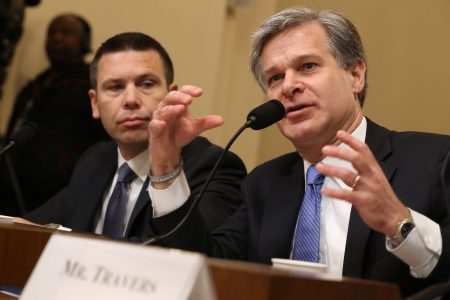
FBI: Domestic terrorism suspects travel overseas for attending training camps
FBI Director Christopher A. Wray told Congress on Wednesday that American neo-Nazis seem increasingly to be communicating with like-minded violent racists overseas, but he cautioned that those links so far appear more about inspiration than organization.
At a House Homeland Security Committee hearing, the FBI director was pressed repeatedly to explain trends among domestic terrorism suspects, and what the FBI is doing to combat such threats.
Wray said the number of such cases has not changed dramatically in recent months but noted that senior U.S. officials have discussed how some suspects are in touch with, or in some cases traveling overseas to join, like-minded groups.
Rep. Lou Correa (D-Calif.) said he was concerned about domestic terrorists traveling to Ukraine for training “and coming back to do God knows what.” Ukraine has a number of paramilitary groups that have drawn the attention of American extremists, according to U.S. counterterrorism experts.
Wray responded: “I think you’re onto a trend that we’re watching very carefully. . . . We are starting to see racially motivated violent extremists connecting with like-minded individuals online certainly, and in some instances, we have seen people travel overseas to train.”
Last month, the FBI arrested an Army soldier who had hoped to join a Ukraine militia, following the example of a former U.S. military soldier who had done so.
Wray said that U.S. violent extremists still, by and large, lack organizational structure and direction but that there are now individual terrorism suspects who travel overseas to get training — behavior similar to Americans inspired by the Islamic State or other groups.
“We have seen some connection between U.S.-based neo-Nazis and overseas analogues,” Wray said. “Probably a more prevalent phenomenon that we see right now is racially motivated violent extremists who are inspired by what they see overseas.”
He cited the attack in March on mosques in Christchurch, New Zealand.
“They’re not working together, but they’re just fueled by each other,” Wray said. For years, the FBI has generally described far-right or racist violent extremists as “domestic terrorism,” and violent extremists inspired by Islamist militant groups such as al-Qaeda and the Islamic State as “international terrorism.”
Wray’s remarks suggest those sort of distinctions are fading, as would-be Nazis and would-be Islamist extremists increasingly behave in similar fashion — relying on global networks of ideology, rather than operational command.
“We’ve moved into this world where you have terrorists, including domestic terrorists, who aren’t really that organized,” Wray said. “A lot of times they’re communicating with each other in a more informal way online or in some other way inspiring each other. . . . It’s more diffuse and unstructured and undisciplined.”
That lack of structure, the FBI director said, “makes it more challenging, for example, to get human sources or undercovers inserted. If there’s no organization to insert somebody into, that’s a challenge, so that’s part of the different nature of the threat.”
In the past budget year, the number of arrests for both categories was similar: 107 arrests of domestic terrorism suspects, compared with 121 international terrorism arrests. Many of the domestic terrorism arrests are done by state and local law enforcement for guns, drugs or other charges, often because of differences in how federal terrorism laws are applied to individuals inspired by foreign terrorist groups such as al-Qaeda, and individuals inspired by domestic terrorists such as the Ku Klux Klan.
The FBI has been criticized by some Democrats for not focusing more on domestic terrorists, with lawmakers questioning whether the nation’s premier law enforcement agency has devoted too many resources to Islamist-inspired extremists. Wray and other FBI officials insist they are constantly evaluating threat levels and adjusting personnel accordingly.
“The number hasn’t dramatically changed, but it’s been troublingly consistent,” Wray said. “Certainly the most lethality in terms of terrorism attacks in recent years here in the homeland has been on the domestic terrorism side.”
Rep. Max Rose (D-N.Y.) pressed U.S. counterterrorism officials at the hearing to say whether they could more effectively fight domestic terrorism if extremist militias in Ukraine were branded foreign terrorist organizations.
Wray and the other officials at the hearing demurred, saying that decision was the up to the State Department.
In a recent case, the FBI arrested a soldier in Kansas and charged him with sharing bombmaking recipes with people he met on Facebook. Prosecutors said he was mentored by a former Army soldier who had gone to fight alongside an extremist group in Ukraine.
Investigators say Pfc. Jarrett William Smith, 24, had talked about joining a far-right Ukrainian paramilitary group in 2016 but ended up joining the U.S. Army instead.
Smith has pleaded not guilty.
According to court papers, Smith was mentored by ex-Army soldier, Craig Lang, about traveling to fight in Ukraine.
Lang was arrested in Ukraine after U.S. authorities charged him and another man with the killing of a Florida couple in 2018, allegedly to rob them for money to finance their travel overseas to engage in more extremist violence.
Lang’s journey to Ukraine followed his dishonorable discharge from the Army. In 2016, he allegedly joined the Right Sector, a far-right Ukrainian nationalist paramilitary group dedicated to battling Russian separatists on eastern Ukrainian soil. A year later, he returned to the United States, where he and another former soldier, authorities say, killed the Florida couple in a church parking lot.
His Ukrainian girlfriend’s uncle, Ihor Skritsky, told Radio Free Europe last month that Lang “denies any involvement.”
The United States is seeking Lang’s extradition.
Source: Washington Post





